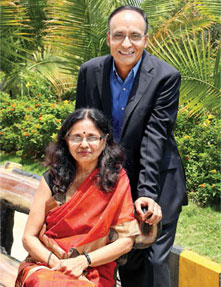
Asha and Ramesh Mirakhur, both top-notch financial professionals, who returned to India after a decade-and-a-halflong corporate stint in the US, an epitome of humility, deep values and a down-to-earth attitude. An in-depth interview on their work and life together
Ramesh K Mirakhur, is presently the Group Head of MasterCard. He has served in top corporate positions for 15 years in the USA, until he returned to India in 2013. An entrepreneurial business executive, he is driven by a passion for leading organisations to achieve profitability, sales, quality and customer service levels that exceed expectations. He has an impressive, vertical industry expertise in BFSI, Logistics and Manufacturing as well as in selling and managing Business and IT Solutions and delivering large-scale engagements in a global delivery model with managed outcome agreements.
He served as General Manager, Global Technology Services (GTC) in Black Knight Financial Services (BKFS), a leading provider of technology, data and analytics to the mortgage industry in the US. As its Resident Director in Hyderabad, he was selling the offshore delivery concept to the different business units. He set up the operations of the GTC, including a new legal entity, financial systems, human resource processes and a facility consistent with global standards of BKFS and Lender Processing Services (LPS). Between 2007 and 2012, he was Vice President, Financial Services for CSC, a Fortune 500 IT products and services company with 98,000 employees worldwide and $16 billion in revenue. In India, he has also worked in top positions in Whirlpool and DHL Worldwide Express and other organisations. He has a Master’s in Industrial Engineering with a major in Operations Research from NITIE, Mumbai and is a Mechanical Engineering graduate from BITS, Pliani.
Asha Mirakhur, graduated with a Master’s from the Indian Statistical Institute. She joined the National Institute for Training in Industrial Engineering (NITIE) as a Research Fellow. She worked in the field of Energy Modelling and has authored five papers in this, then nascent, area. She then moved on to Reserve Bank of India (RBI) after a brief stint at the Indian Institute of Management, Ahmedabad. At RBI, her responsibilities varied from custody & issuance of currency, to inspecting commercial banks, to introducing computerisation in these banks, to designing & developing Management Information Systems for the RBI’s Deputy Governor.
In India, our mission is
to touch a million lives
by 2020 by supporting
non-profits that help
in employment generation.
We support these
non-profits through
financial assistance and
management competencies
to make them
long-term sustainable
— Ramesh
After the family shifted to the US, Asha resigned from the General Manager’s position at the RBI. In 2001, she joined the Kent State University (KSU) where studies were being conducted to understand the effects of intervention measures implemented to help children who were affected by violence in their communities/schools. In 2008, Asha joined Progressive Insurance in its Corporate Claims Department. There she conducted analyses to understand the patterns and trends in the claims data, to help management undertake timely responsive and corrective action. Back to India in 2013, Asha was an active volunteer with the local chapter of `Teach For India’ and with the NGO, ‘Save Rocks Society’ in Hyderabad.
Asha: Ours is definitely not an arranged marriage. I come from Kerala, the southernmost tip while he hails from Kashmir, the northern most tip of India. I had finished my post-graduation in Statistics and joined National Institute for Training in Industrial Engineering (NITIE) in Mumbai, for my research fellowship programme; he too came there to pursue Master’s in Industrial Engineering, soon after he graduated from BITS, Pilani. We were in the same campus and so that’s where we met. Initially, we were friends. I think we started becoming serious, only after we left NITIE. By that time, he was working in Pune and me, in Mumbai. It took us seven years to decide that we want to get married.
Ramesh: I left NITIE in two years. As long as we were in the college, we were part of a big group, and she was in NITIE a while longer after I left. And I think that’s when we decided to get serious about each other.
Asha: Actually, I had joined NITIE for a research fellowship programme that had just started, and being the first student, I was something of a guinea pig for the institute. Unfortunately, for me, the research was in the field of energy modelling and there was only one faculty member who could guide me. He went to the USA to present our joint paper and came back with an offer for him to join UNDP in Jamaica. So, I could not continue my fellowship. I went through a bad patch due to this uncertainty and that was the time, Ramesh who was in Pune, would come down to meet me. He was very supportive and I moved on and have not looked back since.
She is very intelligent and extremely
balanced. We always say in our family—and our children also echo the same
thing—that I may have done better in the
corporate world but she is the smarter of
the two of us, just in terms of sheer intelligence and confidence. She is also very
practical and determined; if she sets her
mind to do something, she’ll do it”
— Ramesh
Ramesh: She is very intelligent and extremely balanced. We always say in our family—and our children also echo the same thing—that, I may have done better in the corporate world but she is the smarter of the two of us, just in terms of sheer intelligence and confidence. She is also very practical and determined; if she sets her mind to do something, she’ll do it.
Ramesh: My father did not talk to me for one and a half years after I told them about her, in 1984. I broke the news to my parents through my brother, whom I wrote to, as he was staying with them; there was no positive reaction for a year, so our family underwent a lot of stress. A love marriage, in place of an arranged one, was scandalous enough for him. For a North Indian, marrying someone from a completely different part of the country and that too from South meant that it was an alliance with a ‘Madrasi’ no matter which of the Southern State she came from. My sister and brother-in-law were supportive and it is they who convinced my parents. We got married in 1985; my parents were in Srinagar then.
Asha: On my side, there was no problem at all, because my parents had met him earlier. My parents were in Ludhiana at that time and Ramesh had come to visit his cousin there, who used to teach at Punjab Agricultural University. My parents, having lived all over the world, had a cosmopolitan outlook towards life and were more open to any such alliance. Also, in our family there had been other inter-State marriages, so it was not an issue.
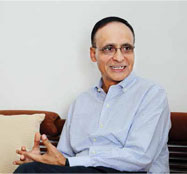
Asha: After I finished my high school from Kendriya Vidyalaya in Chennai, I had a problem, getting into a college as I was interested in pursuing only mathematics. Luckily for me, BSc in Maths was being offered by three colleges in Madras. The first one was Queen Mary’s College which was a government college but there I had no chance because I was a ‘Brahmin’; Stella Maris College required you to pass out from the local board and so finally I got admission in S.I.E.T. Women’s College, which encouraged me as they needed students for BSc, Maths. I finished my under-graduation from there but by then my father was transferred to Ludhiana, from where I decided to do my post-graduation. But due to the hassle of procuring the domicile certificate from Chennai which involved a lot of paperwork, my father advised me to apply for IIT, Delhi.
In the meanwhile, I had applied to the Indian Statistical Institute (ISI) also. I completely forgot about ISI as I didn’t hear from them, so I joined IIT, Delhi for my Master’s in Maths. And then one fine day, I get called by my head of the department’s office, who says, “Here, there’s a telegram for you.” He said, ‘‘you have got into ISI.” (The letter was actually sent to my father’s office but he had gone to Kerala on vacation. His secretary knew I was in IIT Delhi, so he sent a telegram to the Maths department.) A bit startled, I told him that I have already got into a good institute and so I would not be accepting the offer. So he told me, “Three years of ISI are equal to six years of IIT; I would say that you go.” Incidentally, he too joined as faculty in ISI, two years later.
Reason for pursuing Maths: When I was in high school, my father was keen that I pursue engineering and I wanted to do so, but my mother gave me a piece of advice. Though I am talking of 40 years back, things haven’t changed much. She said that once you get married, the normal thing is that, if there is any family exigency, it’s the woman who gives up the job. So you would be unnecessarily blocking a seat which a man could have used up to earn and support a family. I thought, what she said made sense. So I went in for BSc in Maths and then I decided to do my MSc. I have no regrets because true enough, after marriage, I did quit my job, at one point of time. Had I done engineering, I may have felt a little guilty about taking a break.
Ramesh: I went to school in Srinagar. My dad was in the state government service. As you may be aware, the entire state government moves every six months, from Srinagar to Jammu, so the whole secretariat too moves from the summer capital to the winter capital. I used to move school every six months, until class X. I didn’t think I was a particularly bright student but I stood second in my high school, stood first in the pre-university program of the college and was a state rank holder. Born and brought up in Kashmir, I didn’t know anything about the rest of India; I was unaware of institutes like IITs and BITS, Pilani. So I never applied to any of them. My only option was to go to Regional Engineering College, Srinagar, where, being a merit holder, I would get a free ride. However, I was not too keen on it; I just wanted to go and explore the world. It was my good fortune that my brother had done his medicine from Srinagar and found himself a job, in Delhi and then in Chandigarh, where I visited him. He told me about IIT and BITS, Pilani. I got admission in IIT BHU as well as in BITS Pilani and opted for the latter.
I come from Kerala, the southernmost
tip of India, while he hails
from Kashmir, the northern most tip
of India. I had finished my post-graduation
in Statistics and joined NITIE in
Mumbai for my research fellowship programme;
he too came there to pursue his
Master’s in Industrial Engineering soon
after he graduated from BITS, Pilani
— Asha
It was a culture shock for me, when I joined BITS, Pilani. I did not know how to speak English well and I remember how much fun I used to be made of, in the first year. Slowly, I learnt English and could flaunt it around. I got involved in a number of extracurricular activities in BITS. For example, when I was a fresher, we started an ‘earn while you learn’ programme. We made sure that even the rich students join this programme in order that it did not seem like it was only for those students who could not afford the fees. Prof K R Chandoke, whom I had worked with for this unique programme, became my lifelong friend. Under this programme, I used to also take tuitions in Statistics and Mathematics. The basic premise of the programme was that we wanted the college students to use their time meaningfully, rather than just waste it away.
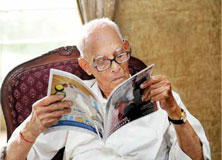
It was fine until 1989. There used to be an undercurrent between Hindus and the minority community but it was a very peaceful place. I had several Muslim friends who used to come home regularly. But slowly there was resentment building up in the society, as Kashmiri Pandits had the lion’s share in all the government jobs, being more focused in education. That was also one of the reasons why I did not want to pursue college education there. Though BITS Pilani was expensive in terms of fees, I was lucky that I could study there as my brother took up the onus of supporting me.
Post 1989, it became impossible to live there due to constant violence. My parents had to migrate out of Kashmir—they lost their house and belongings. In 1989, one day I was going to work in the morning at 8 am, Asha asked me to read the newspaper as the front page news in the Times of India stated that there was a bomb blast in Srinagar. I called up my neighbour who said he would find out and revert back to me. Indeed the blast had occurred near my parents’ house and they were lucky they had escaped, as our house had suffered damage. I went to visit them but they were not too keen to move. However, in November 1989, the current chief minister’s sister got kidnapped and the situation worsened. At that point of time, my parents had come for a function to Bhopal and because of the situation in Kashmir, we did not let them go back.
Ramesh: I was working with Tata Motors and then with DHL. She joined the Reserve Bank of India. When we lived in Mumbai from 1985 to 1990, our daughter was born. In 1990, she got transferred to Bangalore and I used to shuttle between Bangalore and Mumbai. When she went to Bangalore, we were expecting our second child .My employers were understanding enough to also let me work from Bangalore for a couple of years. She lived in Bangalore for a few years and came back to Mumbai. Thereafter, I got a job in Delhi so she followed me. Finally, we moved to the USA in 1998.
Asha: Reserve Bank was a very family-friendly organisation; it used to give us housing wherever we were transferred to. Quite a few women, who had support of their in-laws, moved without their husbands or without the children also. So that way it wasn’t traumatic; it was pretty smooth.
Asha: Ramesh wanted some international exposure and got a job offer in Ohio, USA. So, in 1998, the children and I, joined him. Initially, our plan was to be there for a couple of years and then come back. The Reserve Bank had a facility in which, if your spouse was posted abroad, you could take two years’ unpaid leave and return to your job, in the same position that you left. It was a beautiful arrangement. At the end of the two years when we talked to our kids about coming back to India, they said that they liked the educational system there. So we decided to continue staying there. I then sent in my resignation. We eventually stayed in the USA for 15 years and came back to settle in India, in 2013.
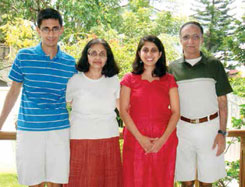
Ramesh: Our daughter’s name is Zitsi and our son’s name is Yatin. Our names being common, we wanted an unusual name for our daughter. I think till date definitely Zitsi has a record because I have not heard of another. It’s a name that we made over a dinner one day before she was born. My paternal grandmother’s name is Zitsmaal—‘Zits’ means ‘ray of light’ and ‘maal’ means ‘necklace’. We tweaked it a bit to make it Zitsi. Our son is Yatin. So we have a Z and a Y.
Ramesh: We have one socialist and one capitalist in our family. Our daughter is pursuing her PhD at Princeton. She did her under-graduation at the University of Chicago and then joined ‘Teach For America’. During that stint, she was teaching underprivileged high school students in New Orleans, USA. Our son is quite the opposite. He also went to a good school, the University of Pennsylvania and Wharton, got himself one undergraduate degree in Computational Biology and another in Economics, in four years’ time. He now works on the Wall Street in New York City.
Ramesh: The work culture there is very different and Asha can tell you about her experience too, because she also started working after some time.
I was working for Computer Sciences Corporation and I didn’t have a major challenge adjusting to the work culture there; in fact I liked the work culture there. It’s very focused as it depends on how you perform; it’s not focused on age or your background. I loved working with the American bosses. They don’t care how you get something done; you just get your work done. They are also very sensitive to work-life balance; so you don’t feel guilty about taking a vacation; when you come back to work, you have to be wholeheartedly there. So, it is far more a results-focused environment. Then, there are not many layers. People are usually direct. You don’t feel any diffidence, when you are in a meeting. Actually, when I left from here (India) I was a bit wary. Several friends wondered why I am going as at that point of time I was the CIO for Whirlpool, South Asia and probably one of the highest paid CIOs in the industry at that point. I said I want some different experience.
Post 1989, it became impossible to live there due to constant violence. My parents had to migrate out of Kashmir—they lost their house and belongings. One day I was going to work at 8 am, Asha asked me to read the newspaper which stated there was a bomb blast in Srinagar
— RameshRamesh: Yes, I think Indians do well there for two reasons. One is this natural selection; only the brighter ones go and I am a great believer in cognitive ability; intelligent people can do lots of different things. Second, is the work environment there; if I had to pick a country for anybody to immigrate to, there is only one country and that’s the USA.
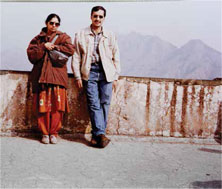
Asha: My experience too was a very positive one. When I went from here, I went as a dependent spouse; I did not have a work visa for the first three or four years. I was a homemaker, attending to kids as they needed help chauffeuring for their various activities. During the day though, I had some time for myself, so one day, I clicked on website of the Kent State University, which was very close to where we were living. I sent out my CV and they called me for an interview. It was a very nice experience and they asked me as to when I could join. I had to express regret that I couldn’t join as an employee because I did not then have a work visa. But, I said, I would like to volunteer and do something to contribute to the organisation. Being a very unusual situation they had to get back to me after checking with their personnel department. For two months, I did not hear from them so I thought it’s over. One fine day, I get a call from them saying that you can work as a volunteer. The professor I was working with was a Malaysian and he knew the formalities of getting a work visa, green card and so on. So, as soon as I got my Employment Authorisation, they took me on board. I wanted a job which was for only 20 hours a week so that I could be there for the kids also when they needed me. I worked for seven years until 2008.
Then in 2008, when our son went off to college we were ‘empty nesters’. and I decided to go in for a full-time job. I joined an auto insurance company called ‘Progressive Insurance’—in the Corporate Claims Department.
Ramesh: I’ll tell you an interesting experience while joining Progressive Insurance. She wanted to work full time so she applied for a full-time job. And they didn’t call her for an interview. I used to work with Progressive Insurance, as they were one of my customers. I happened to know Brian, their Division President, so I went to him and said that my wife has applied for a job but they haven’t even called her for an interview. He took her résumé from me. The next day she got a call and then of course, she was selected. So I called Brian to thank him. I said, “What did you do?” He said, “She is an unusual employee because she is not 30-year-old, which is the normal recruitment age. And all I did was, encouraged them to talk to her. I just said, interview her.” And once they called her, they immediately hired her.
Asha: I was an analyst at the back end, and not dealing actually with the customers. It was a beautiful learning experience for me, more than anything else. We were not dependent on my income so I didn’t have any stress about that. I could enjoy myself with the job. And the US corporates are pretty open about all these things, if you want to learn something, they just sit with you and then they teach you the latest techniques in computers with data analysis and everything. I would go for all the training programmes and then they would tell me, okay, now start working on it. It was very nice.
The institution of marriage itself is
being challenged, and
potentially, could vanish in 20 – 30 years.
I won’t be surprised if the institution of
marriage changes drastically or its
importance gets reduced
— Ramesh
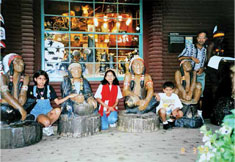
Asha: Actually we had discussed it when we got married and I was expecting our first child. We had some sort of a tacit understanding that if anybody had to give up a job it would be me because Ramesh was on a sort of a broader career path than I was.
Ramesh: I actually several times offered to her that I would leave my job and take care of the children and she could continue working. She probably had no confidence that I could bring up children!
Asha: You need both the parents to be involved. So when we were both working, we would share the responsibility. When we were in Delhi, I was sent on a training programme to Mumbai, he had to take care of the kids!
Ramesh: We have some funny stories like I had to get a friend to come over and help me cut a pineapple because our daughter was asked by her school to get one and I didn’t know how to go about it.
Asha: When we were expecting our second child, I was transferred to Bangalore. Initially for about two or three weeks, he took time off from his company, and was babysitting our daughter, while I went to work. He went back to work, once I got the bank’s housing accommodation and could move out of the temporary hotel room.
When we went to the USA, initially, I gave up my job. At that time, my input with the children was a little more. Further, he was travelling a lot; he used to be a ‘weekend father’ for quite some time because he would leave on a Monday morning and come back only on Thursday night or a Friday evening. So the entire responsibility of parenting, fell on me. I would run the house and ferry the kids to and fro. But we would ensure that, at least during the weekends he would spend time with the kids. We were very clear that once a year we went on a family vacation where we would just chill out together.
Ramesh: Even though she is good at numbers and a banker, she does not look after the finances. She is very clear that only one person can do it, but yes, you can sit down and explain to her; she will understand and really pass a judgment which is valuable.
Asha: At the same time, I have the confidence that he is doing it, so the family welfare is taken care of and that’s it
Eat more of turmeric powder, shun green and red chillies for longevity, says Prithvi Nath Mirakhur!
He is tall, slim and at 102 years of age, is enthusiastic about life. He smiles affectionately to welcome you. He is curious about knowing, what the interview of his son and daughter-in-law is all about. Comfortably seated on a resting chair, he browses through an issue of Corporate Citizen and says it is very interesting.
Yet upright while sitting or standing, his daughter-in-law, Asha states, “He has made a lot of friends in our housing society. He goes down for two hours in the evenings for a walk. Of course, he does not walk continuously; he sits and chats with friends, in between walking."
His son Ramesh proudly adds that “he continues to have a very well balanced diet. His four meals include toast and milk in the morning; chapatis, dal and subzi for lunch and dinner and a small snack thrown in, early evening."
I have always seen my father working very hard, throughout his life. He was not a wealthy man, so after coming back from his government duty, he would take tuitions
What is the secret of his longevity? Says Ramesh, “I have always seen my father working very hard, throughout his life. He was not a wealthy man, so after coming back from his government duty, he would take tuitions. I have never seen him sitting idle, and that I think is also a reason for his good health. Yes, and Asha has to separately cook his vegetable and dal as he requires a generous helping of turmeric powder in them.’’
Mirakhur, who is blessed to have been looked after by his son and daughter-in-law, has seen the best and the worst of Kashmir, as a Kashmiri Pandit. After things got worse in 1989 between the two communities, Ramesh and his wife decided it would be unwise for the parents to go back to Kashmir. A few years back, Prithvi Nath Mirakhur lost his wife.
Mirakhur is completely hard of hearing but looks forward to get into a conversation. His enthusiastic spirit reflected when he bid adieu to us with a shake hand and an affectionate smile.
I loved working with the American
bosses. They don’t care how you get
something done; you just get your work
done. They are also very sensitive to work-life
balance; so you don’t feel guilty about taking
a vacation; when you come back to work, you
have to be wholeheartedly there
— Ramesh
Asha: One should remember that there is no perfect life, there is no utopia, so there is a lot of adjustment to be done. And it’s not a question of who sacrifices more—it depends on the circumstances. In my case, I gave up my job, but I have no regrets; it was a very happy decision. So it’s up to you. These days you see quite a few men give up their jobs to do the babysitting. And don’t compare yourself with anybody else, just be yourself, do the best you can, and give a very good value system base for your kids that is what is the diving board for the kids to take off, from.
Socially, in the USA, the unit is an individual. In India, still for good or for bad, the unit is a family. In any marriage, it is two families getting married, it’s not just the boy and the girl, whereas in the US, it’s just the boy and the girl. So, when we moved, we had to be more careful that we teach them value systems which do not clash with our basic value systems. And that the children imbibe a little bit of their Indian-ness and I must say that both the kids have been understanding.
Ramesh: They are independent. We taught them to have independent thinking and be responsible.
Ramesh: It takes a lot. The institution of marriage itself is being challenged, and potentially, could vanish in 20 – 30 years. I won’t be surprised if the institution of marriage changes drastically or its importance gets reduced.
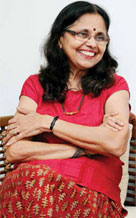
Asha: Frankly, India is still a developing country as we say and there are good things happening and I think once we improve the governance, things should move faster. I was very lucky that I worked in an organisation which was non-corrupt.
When we used to go inspecting banks, I found there were people who were hard-working and honest. We should be able to take off, because Indians have an innate intelligence and when needed, they are willing to work hard. That should pull us out.
Ramesh: I think it’s a long road for transparency; I think the biggest issue always is culture, it is not the laws that we need to change, I think as a society, we need to live the values that we want to talk about. And just across the board, in IT, I see the real challenge; the culture has to change. Back in ’90s, we used to say in India, if we reduce the tax rates, tax avoidance will be reduced; it hasn’t had that kind of impact. I do understand why people do not want to pay taxes in India. While we were in the US, we used to pay higher tax rates. We felt that we, as citizens, need to get something for paying our taxes—get good quality roads, good water supply and a good rule of law. When citizens get the feeling that they are getting value for the taxes that they pay, then people won’t mind paying. In the US, I would not be scared of going to a police station to file a complaint. In India, people find it terrifying.
I am an active Rotarian and a member of the Rotary Club of Poona North. Rotary is a great organisation that combines ‘Doing Good’ and an active fellowship among its members. Rotary has 1.2 million members worldwide and has a long history in India. One of the most notable programmes of the Rotary in India involved eradication of polio. Personally, I am interested in our educational initiatives and I am also the head of the public relations committee of my Rotary Club of Poona North. Asha is also an active member of the Inner Wheel Club.
Social Venture Partners is a philanthropic organisation that connects people who want to give back to society and help non-profits that make change possible in society. In India, our mission is to touch a million lives by 2020 by supporting non-profits that help in employment generation. We support these non-profits through financial assistance and management competencies to make them long-term sustainable.
Ramesh: Just enjoy what you do today, don’t worry too much about tomorrow. Tomorrow will take care of itself. And maintain your integrity so you can get a good night’s sleep.
Asha: The same, more or less. Life is not perfect. But like they say, if life gives you lemons, make lemonade and drink it and enjoy it.
By Vinita Deshmukh